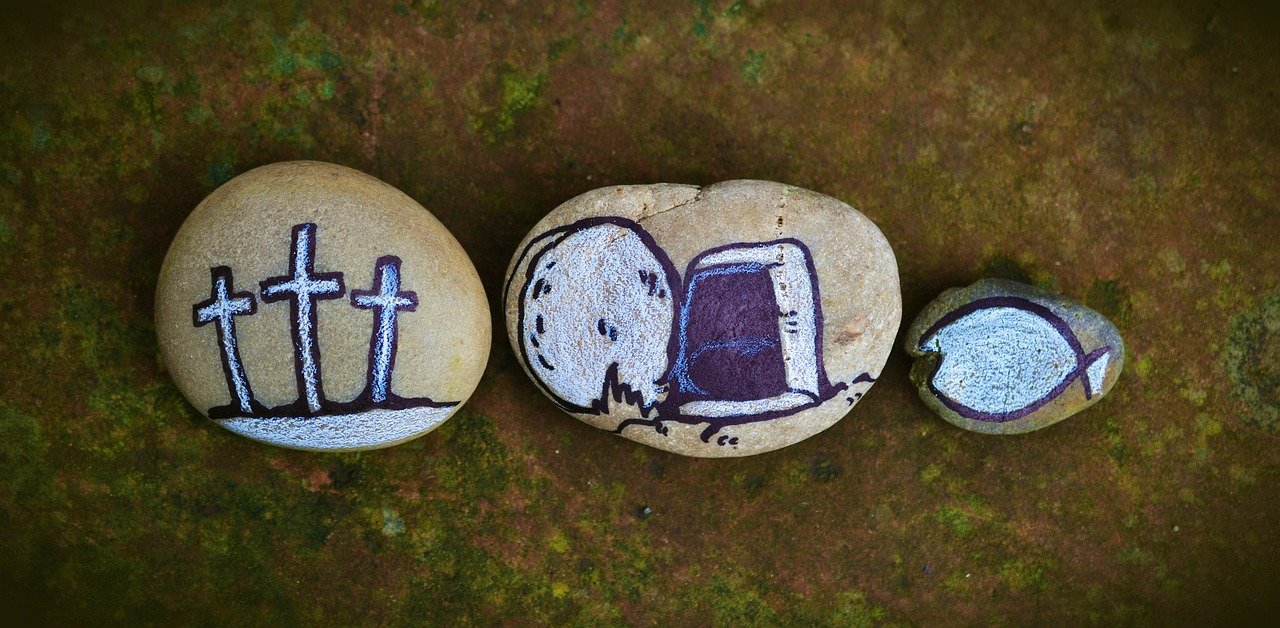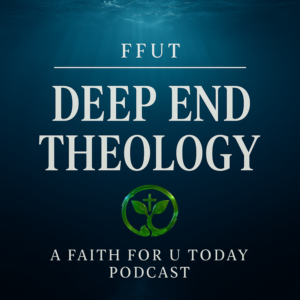The Gospel is Good News
A Savior Has Come to Save the World
From the very beginning, in the Garden of Eden, God promised a Savior who would restore humanity’s relationship with Him. When Adam and Eve sinned, breaking fellowship with God, He made a promise of redemption.

In Genesis 3:15, as God pronounces judgment on the serpent, He also gives a prophetic promise:
“He will crush your head, and you will strike His heel.”
This verse foreshadows Christ’s victory over Satan. Though the enemy would wound Christ (symbolized by the bruised heel, referring to the crucifixion), Jesus would ultimately defeat sin and death (by crushing the serpent’s head).
Throughout the Old Testament, God’s people looked forward to the coming Messiah, trusting in His promise. Today, as believers, we look back to Christ’s completed work on the cross. Our faith is in the same triune God, who planned salvation from the beginning of time.
The Gospel Calls for Change
The Old is Gone, the New Has Come
 The gospel is not just a message of salvation—it is a message of transformation. Change is never easy and always comes at a cost. True repentance means more than just stopping bad behaviors; it is a daily turning away from sin and toward God.
The gospel is not just a message of salvation—it is a message of transformation. Change is never easy and always comes at a cost. True repentance means more than just stopping bad behaviors; it is a daily turning away from sin and toward God.
Many misunderstand repentance, thinking it simply means feeling sorry or stopping a particular sin. But repentance is a lifelong process. It requires deliberate action and the formation of new habits that glorify God and serve others.
Without intentional effort, change is impossible. It starts small—resisting anger, speaking with kindness, practicing generosity—and grows through consistent, Spirit-led obedience. Change doesn’t happen overnight, and it’s not always easy. But true transformation comes when we surrender to Christ and allow Him to reshape our hearts and minds.
The gospel is about changing lives—changing our hearts, our thinking, and our relationship with God. It is a call to embrace new life in Christ.
The Gospel is the Kingdom of Heaven on Earth
 The gospel is also described as Jesus bringing Heaven to Earth. He did not come to establish a temporary earthly kingdom, but to usher in the eternal Kingdom of God.
The gospel is also described as Jesus bringing Heaven to Earth. He did not come to establish a temporary earthly kingdom, but to usher in the eternal Kingdom of God.
Jesus, who is from Heaven, came down and brought Heaven with Him. Wherever Christ reigns, there His kingdom is. Unlike earthly kings who demand service from their people, Jesus humbled Himself to dwell among us (Philippians 2:6-8).
Many imagine Heaven as a distant place, but Jesus said:
“The kingdom of God has come near.” (Mark 1:15)
Even after His ascension, the Kingdom of God remains because He sent the Holy Spirit to dwell among His people. God reigns today, and His kingdom is made up of those who follow Christ and live under His authority.
 Despite what some may think, the world does not belong to the devil. Satan is a defeated enemy, restrained by God’s power. There is no cosmic struggle between two equal forces—God alone is sovereign. He has established His kingdom, and it will never fall.
Despite what some may think, the world does not belong to the devil. Satan is a defeated enemy, restrained by God’s power. There is no cosmic struggle between two equal forces—God alone is sovereign. He has established His kingdom, and it will never fall.
As followers of Christ, we are invited to participate in His kingdom. We don’t just wait for Heaven—we live in God’s kingdom now, as His people, under His rule, for His glory.
The Gospel is a Transaction
Jesus Takes Your Sins, You Take His Righteousness
The Gospel can also be understood as a transaction. One way to grasp how we are saved is by thinking of it in terms of a marketplace exchange. Calling salvation a mere transaction would be an insult to the beauty of the sacrifice—it is infinitely more. But for the sake of illustration, let’s look at it this way.
 A transaction happens when two parties exchange goods or services for something of value. It is an agreement that the exchange is fair. In modern times, we solidify transactions with a handshake or a written contract that ensures neither party can break the agreement without consequences.
A transaction happens when two parties exchange goods or services for something of value. It is an agreement that the exchange is fair. In modern times, we solidify transactions with a handshake or a written contract that ensures neither party can break the agreement without consequences.
In the Gospel, the transaction is this: Jesus gives His life for yours.
When God created the world, it was perfect and sinless. But sin entered through Adam, changing the course of history and severing the relationship between God and His people. Because of sin, humanity was separated from God, unable to fellowship with Him. God, in His holiness, cannot be in the presence of sin. But He had a plan to restore His people to Himself.
 The problem? Sin blinds and corrupts the human heart. On our own, we would never seek God or turn to Him. That’s why Jesus had to come down to us. He didn’t just tell us about a new way—He lived it. And He lived it perfectly. No other human being has ever lived a sinless life except for Christ. This is what qualifies Him to be the Savior of the world.
The problem? Sin blinds and corrupts the human heart. On our own, we would never seek God or turn to Him. That’s why Jesus had to come down to us. He didn’t just tell us about a new way—He lived it. And He lived it perfectly. No other human being has ever lived a sinless life except for Christ. This is what qualifies Him to be the Savior of the world.
Jesus was not merely a good teacher or a wise prophet. He was perfect in thought, word, and deed. Unlike us, He was born without sin. Yet, He was put to death because He was different—too holy for a world that loves darkness rather than light (John 3:19). His presence made people uncomfortable because it exposed their sin. Instead of repenting, they rejected Him.
But Jesus died for us. He took our place. And in doing so, He offers us an exchange: His righteousness for our sin.
How Do You “Give” Your Sins to Jesus?
 By repenting and receiving the grace He offers. When you confess your sins and trust in Christ’s work on the cross, you are handing over your sins to Him. Your sins are nailed to the cross, and in return, you receive the reward of His perfect life. It is an exchange of life for life.
By repenting and receiving the grace He offers. When you confess your sins and trust in Christ’s work on the cross, you are handing over your sins to Him. Your sins are nailed to the cross, and in return, you receive the reward of His perfect life. It is an exchange of life for life.
The Bible tells us that Jesus “descended to hell” (Ephesians 4:9). This doesn’t mean He went to a literal place called Hell. Rather, it describes what He suffered on the cross—being cut off from the Father. For the first time in eternity, God the Father turned His back on His Son.
Why? Because in that moment, Jesus carried the weight of the world’s sin. When the Father looked at His Son, He saw our sin, and He rejected Him in the most justified way possible. Jesus cried out, “My God, My God, why have You forsaken Me?” (Matthew 27:46). He had never spoken such words before. But in taking on our sin, He bore the rejection we deserved.
This is the Great Transaction.
You live because Jesus died.
And not only do you live, but you also receive every reward that He earned. Every act of love, every moment of obedience, every righteous deed—those blessings are now yours. This is not just about going to heaven one day. It is about receiving a new life today.
Two Parties Involved: Offered, Not Forced
Now, hearing about this great exchange, we might assume that everyone would immediately accept such an offer. But in reality, most people reject it.
Why?
Because sin blinds people. A sinner cannot think clearly. Those who love their sin will not love God. Those who excuse sin will find ways to excuse Jesus from their lives.
 In every transaction, both parties must agree. But the amazing truth of the Gospel is that Jesus takes full responsibility for keeping this agreement. He does not leave it up to us to uphold the contract. He secures it Himself.
In every transaction, both parties must agree. But the amazing truth of the Gospel is that Jesus takes full responsibility for keeping this agreement. He does not leave it up to us to uphold the contract. He secures it Himself.
All we must do is accept the offer. This is faith. Faith is not just believing in Jesus—it is entrusting yourself to Him. Faith acts. It moves. It responds.
God does not force anyone into heaven. Some say, “If God is good, why doesn’t He just save everyone?” But think about that. Should God force people who hate Him to live with Him forever? Would that be love?
If salvation were merely a choice, no one would ever choose God, because sin has corrupted our hearts. That’s why God’s grace is irresistible. He changes our hearts so that when we see Him for who He is, we cannot help but run to Him.
 Think of it like this: If you stood in front of a breathtaking landscape—so beautiful it left you in awe—you wouldn’t want to look away. That’s what irresistible grace is. When God reveals Himself to you, you are drawn to Him, not by force, but by His overwhelming beauty and love.
Think of it like this: If you stood in front of a breathtaking landscape—so beautiful it left you in awe—you wouldn’t want to look away. That’s what irresistible grace is. When God reveals Himself to you, you are drawn to Him, not by force, but by His overwhelming beauty and love.
If someone offered you a billion dollars, tax-free, with no strings attached, would you refuse it? Of course not. The grace of God is infinitely greater, yet many still turn away.
The Gospel Is Jesus Christ
The Life of Christ
 When we speak of Christ’s life, we refer to His perfect life. Jesus is called the Second Adam (1 Corinthians 15:45). Adam, the first man, represented all of humanity—but he failed. His sin brought death to us all. Jesus, the Second Adam, lived the life Adam (and all of us) failed to live.
When we speak of Christ’s life, we refer to His perfect life. Jesus is called the Second Adam (1 Corinthians 15:45). Adam, the first man, represented all of humanity—but he failed. His sin brought death to us all. Jesus, the Second Adam, lived the life Adam (and all of us) failed to live.
Adam’s sin led to murder. Jesus’ obedience leads to love.
Adam broke the law. Jesus fulfilled it.
Adam built the city of man. Jesus brought the Kingdom of God to man.
Jesus’ perfect life is credited to us when we trust in Him. His life for our life. His death for our death.
The Death of Christ
 The world recognizes Jesus more for His death than His life. We see crosses everywhere, symbolizing His crucifixion. But why did He die?
The world recognizes Jesus more for His death than His life. We see crosses everywhere, symbolizing His crucifixion. But why did He die?
The cross was a slow, torturous execution. Many criminals died on crosses, but Jesus’ death was unique. He had done nothing wrong.
The Bible tells us that sin’s consequence is death (Romans 6:23). Jesus, being sinless, should never have died. His execution was an injustice—but it was also the means by which God justifies us. Jesus took the punishment we deserved so that we could receive the eternal life He deserved.
This is the transaction.
To put it in simple terms: Jesus had a “get out of jail free” card, and He gave it to you.
The Resurrection of Christ
 The Apostle Paul said, “If Christ has not been raised, our faith is in vain” (1 Corinthians 15:14). The resurrection is not just part of the story—it is the story. Without it, Jesus would be nothing more than another religious teacher.
The Apostle Paul said, “If Christ has not been raised, our faith is in vain” (1 Corinthians 15:14). The resurrection is not just part of the story—it is the story. Without it, Jesus would be nothing more than another religious teacher.
Many false theories have been proposed to explain away the resurrection—the Swoon Theory (Jesus only fainted), the Hallucination Theory (the disciples imagined Him), the Substitution Theory (someone else died in His place). But Thomas, one of Jesus’ own disciples, knew Jesus was dead. When Jesus appeared to him, Thomas’ response was not to test his theory but to fall to his knees in worship:
“My Lord and my God!” (John 20:28).
The resurrection proves that Jesus is who He claimed to be—God in the flesh. The One who has power over life and death.
This is the Gospel. Jesus Christ—His life, death, and resurrection.
Will you accept the transaction offer?
Final Thoughts
The gospel is more than just a message—it is the power of God for salvation (Romans 1:16). It is the good news of Jesus Christ, the call to transformation, and the establishment of God’s kingdom on Earth.
Have you embraced this gospel? Are you allowing its truth to change your heart, your habits, and your hope for the future?Jesus is calling. The kingdom is here. The time to believe is now.







